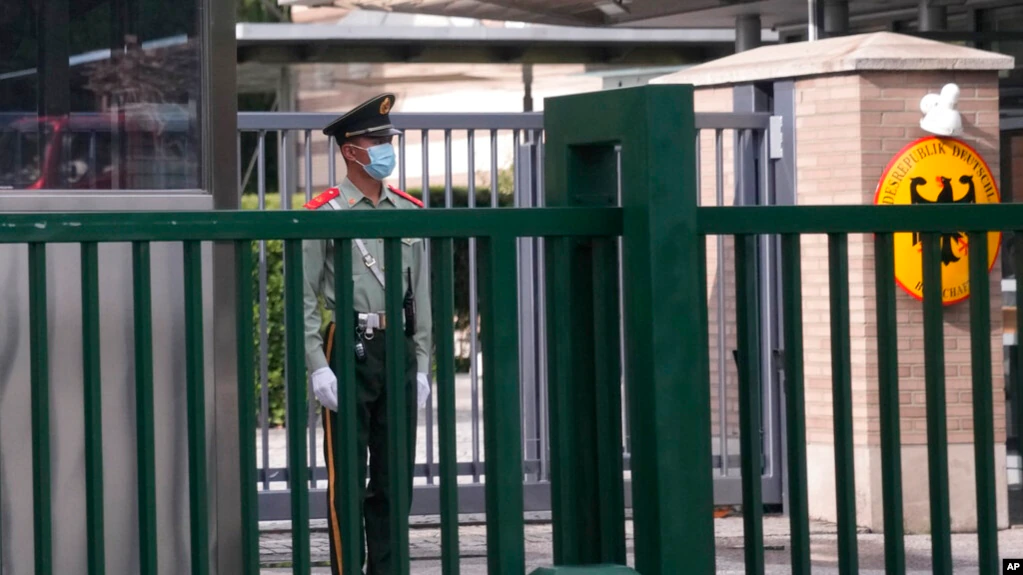China watchers are applauding the German embassy in Beijing for a subtle dig on social media that drew attention to China’s strict control over political messaging in the days before a high-profile visit by German Chancellor Olaf Scholz.
On Oct. 11, Patricia Flor, the first woman to lead Germany’s diplomatic mission in Beijing since the two nations established diplomatic relations in 1972, posted on her Twitter page: “Starting from today, we will look back on 50 events from those 50 years” on the embassy’s official Weibo channel.
In the ensuing days, the embassy posted vignettes on China’s Twitter-like platform about events like the establishment of Volkswagen’s first plant in Shanghai in 1983. To mark the year 1988, the embassy posted a note about the opening in Beijing of the Goethe Institute, which today hosts cultural activities in Beijing, Shanghai and Hong Kong.
The next year, 1989, however, was profiled differently.
In a split-screen posting, the left-hand panel displayed a large crowd gathering at the Brandenburg Gate in Berlin with a caption that read: “In East Germany … more and more people are staging protests for democracy and citizens’ rights, which led to the peaceful revolution of November 1989, and prompted the fall of the Berlin Wall that separated the two Germanys.”
The right-hand panel was completely blacked out, as was what appeared to be a six-line caption. But the point was obvious to anyone who has followed Chinese political affairs: That was the year of the student protest in Beijing’s Tiananmen Square, which was brutally crushed with likely thousands of young people killed.
Asked by VOA what message the embassy was trying to convey, a spokesperson declined to elaborate, saying only that “it’s all in the eyes of the beholder, people can find their own interpretation and try to make sense of it.”
But many Chinese Weibo readers clearly got the point. The post received nearly 4,000 ‘likes,’ compared to 200 to 300 for most other posts in the series.
Flor spoke of the subtleties of linguistic diplomacy in an interview last month with China.Table, an influential German digital media outlet dedicated to China watching.
“As a diplomat, you have to weigh carefully how to deal with the instrument of language — because that is our strongest weapon,” she was quoted as saying.
She vowed in the interview to increase the embassy’s presence on social media, to communicate frankly to Chinese audiences about German policies toward their country and maintained that aside from meeting government officials, her job entailed meeting with, and voicing concerns for, Chinese human rights defenders.
Janne Leino, who lived and worked in China from 2015-21 for a European think tank, described the posting as a “clever move” that enabled the embassy to evade China’s strict censorship of the Weibo platform while delivering a message about the very different handling of the 1989 protests in the two countries.
“Hat off to the guy in Beijing for that,” said Leino, who recalled some of the ways he saw Chinese netizens work to evade the censors, including the use of alternative names to address events and of language that would only be understood by people with a deep knowledge of events.
Leino, now an analyst at the Konrad Adenauer Foundation, said in a phone interview from Brussels that most Europeans are unaware that Western social media platforms including Twitter, Facebook and Instagram are blocked or subjected to strict regulation in China, although some Chinese manage to access these platforms using VPN.
He lamented the advantage that gives to China’s diplomatic “wolf warriors” who are free to use Western social media platforms such as Twitter to “pretty much post anything they want and spread information or false information or disinformation.”
The German embassy’s noir post was also admired by China.Table, whose interview with the German ambassador was conducted just a few weeks earlier.
“For more than 30 years, the Chinese government has worked hard to banish the state-ordered bloodshed of June 1989 from the population’s collective memory. To this end, it strictly censors direct as well as indirect references to the tragedy and punishes any form of commemoration,” an article published on China.Table read.
“With the post, the embassy holds a mirror up to the Chinese government just days before the visit of German Chancellor Olaf Scholz,” the article noted. Scholz’s visit to Beijing with a group of businessmen on Nov. 4 was criticized for favoring business relations at the expense of human rights and democracy.

